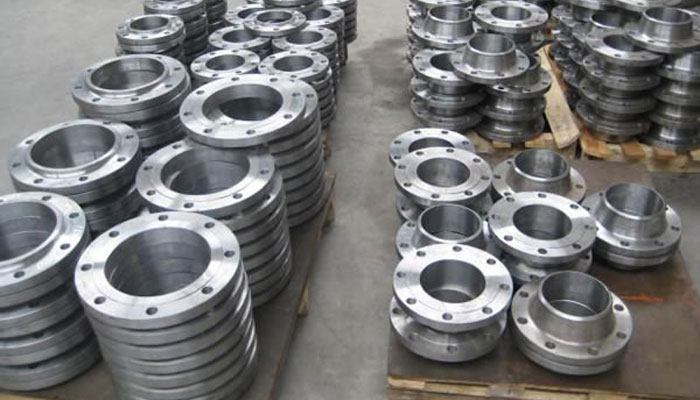Introduction:
In the realm of high-performance alloys, Inconel 625 emerges as a formidable contender, celebrated for its exceptional corrosion resistance and versatility. This article embarks on an extensive exploration of Inconel 625 flanges, delving into the intricacies of their composition, manufacturing processes, and the myriad applications that make them indispensable in critical industrial scenarios.
Understanding Inconel 625:
Inconel 625, a nickel-chromium-molybdenum alloy, stands as a testament to the ingenuity of materials engineering. Renowned for its exceptional corrosion resistance in harsh environments, Inconel 625 has become the material of choice for applications requiring high strength, durability, and resistance to oxidation and chemical corrosion.
Inconel 625 Flanges: An Overview:
Inconel 625 flanges, born from the robust alloy, inherit its extraordinary properties. These components play a pivotal role in connecting pipes, valves, and other equipment in industrial systems. The unique combination of strength and corrosion resistance makes alloy 625 flanges vital in applications where reliability under extreme conditions is non-negotiable.
Composition and Properties:
A carefully balanced amalgamation of nickel, chromium, molybdenum, and niobium, among other elements, forms the composition of nickel alloy 625 pipe flanges. This alloying composition imparts exceptional resistance to both oxidizing and reducing environments, making nickel alloy 625 pipe flanges suitable for applications ranging from chemical processing to aerospace engineering. The properties of high tensile strength and toughness further solidify their position in critical industrial operations.
Manufacturing Excellence:
The manufacturing of nickel alloy 625 pipe flanges demands precision and expertise. Suppliers utilize various processes, including forging, machining, and heat treatment, to shape the raw Inconel 625 material into flanges that meet stringent industry standards. The attention to detail in the manufacturing process ensures that alloy 625 flanges exhibit the desired mechanical properties and corrosion resistance essential for their intended applications.
Types of Inconel 625 Flanges:
Inconel 625 flanges come in various types, each designed for specific applications and operational requirements. Weld Neck Flanges, Slip-On Flanges, Blind Flanges, and Lap Joint Flanges are among the common types. Factors such as pressure, temperature, and the nature of the fluid or gas being transported influence the choice of flange type. Manufacturers meticulously craft each type of Inconel 625 flange to address specific challenges in diverse industrial settings.
Applications Across Industries:
The versatility of Inconel 625 flanges extends across a wide array of industries. In chemical processing plants, these flanges play a crucial role in connecting pipelines and equipment handling corrosive substances. In the oil and gas industry, alloy 625 flanges are employed in high-pressure and high-temperature environments, showcasing their resilience in extreme conditions. Aerospace applications benefit from the alloy’s lightweight yet robust nature, making alloy 625 flanges integral in the construction of aircraft and spacecraft.
Corrosion Resistance in Challenging Environments:
One of the standout features of alloy 625 flanges is their unparalleled corrosion resistance. In aggressive chemical environments, where other materials might succumb to degradation, alloy 625 flanges maintain their structural integrity. This resistance to corrosion makes them ideal for use in applications involving acids, alkaline solutions, and saltwater.
Inconel 625 Flanges in High-Temperature Environments:
Nickel Alloy 625 pipe flanges excel in high-temperature environments, where their ability to withstand thermal stress sets them apart. Whether in industrial furnaces, heat exchangers, or steam generators, alloy 625 flanges provide a reliable connection, ensuring the integrity of the overall system even under extreme heat conditions. This makes them invaluable in industries where temperature fluctuations are a constant challenge.
Supplier Selection for alloy 625 flanges:
Choosing reputable suppliers closely ties the reliability and performance of alloy 625 flanges. Established suppliers adhere to industry standards, providing flanges with the required certifications and quality assurance. When selecting a source for Nickel Alloy 625 pipe flanges, one should consider factors such as the supplier’s track record, compliance with specifications, and the ability to meet customized requirements.
Innovation and Future Prospects:
The landscape of alloy 625 flanges is set for further innovation as technology advances. Ongoing research and development focus on enhancing the alloy’s properties, pushing the boundaries of performance. Innovations in manufacturing techniques, such as additive manufacturing (3D printing), are opening new possibilities for the design and production of alloy 625 flanges, paving the way for even more efficient and customized solutions.
Conclusion:
In conclusion, nickel alloy 625 pipe flanges epitomize the marriage of strength and versatility in the realm of materials engineering. From their composition and manufacturing excellence to their diverse applications across industries, Inconel 625 flanges play a pivotal role in ensuring the reliability and integrity of critical industrial systems. As industries evolve, and technological advancements continue, the future of alloy 625 flanges promises even more sophisticated solutions, reaffirming their status as indispensable components in the intricate machinery that powers our modern world.
